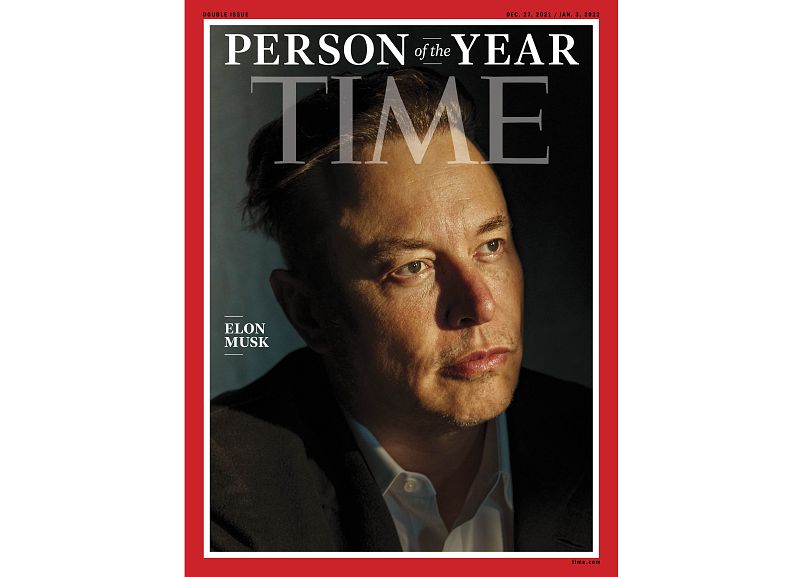The entrepreneur courted consistent controversy in 2021 but received the ambiguous honour for his public prominence and financial success.
Tesla founder and world's richest man Elon Musk has been named Time’s 'Person of the Year' 2021, above vaccine developers, key workers, and other public figures touted for the accolade.
Musk – who surpassed Amazon founder Jeff Bezos as the world’s wealthiest person this year – was called a "clown, genius, edgelord, visionary, industrialist, showman," by the magazine when they put him on the cover.
The rising price of Tesla stock pushed Musk’s net worth to around $300 billion (€265 billion), making him potentially the richest man in history according to Forbes.
On December 13 he sold another chunk of stock worth €800 million.
Time's decision has set off a number of debates among Musk fans and skeptics.
Other controversial choices have been Adolf Hitler in 1938, Joseph Stalin in 1939 and 1942, and former New York Mayor Rudy Giuliani in 2001, who experienced a fall from grace as part of the Trump administration.
The year of the Musk
Musk is closely linked to two of the most prominent fields of tech innovation in the public imagination: climate solutions and space exploration.
The CEO's endeavours include founding of SpaceX in 2002, to his hand in the creation of the alternative energy company SolarCity in addition to electric vehicle maker, Tesla.
Time emphasises that its annual acknowledgement is not an award, but rather, "recognition of the person who had the most influence on the events of the year, for good or for ill."
Social media hero/real life villain?
Musk first garnered wealth in the early 2000s through his involvement running Paypal, a cutting-edge technology of that time later sold on to eBay.
His real prominence came a decade later as he accumulated the funding to pursue more ambitious projects.
To some Musk embodies the position of a billionaire an aspirational capitalist society, to others he’s a caricature of a super villain.
His huge advancement of green technology in the form of Tesla's electric cars is often outweighed by his vision for humanity to live in space. Fans of Musk argue to this solutions-based thinking, a necessity for the problems our world will be faced with in decades to come.
Some of the billionaire's earlier controversies – smoking cannabis on Joe Rogan’s podcast in 2018, for example – pale in comparison to the headlines he has made this year.
Musk’s massive social media following was highlighted by Time in their cover story. The billionaire uses his Twitter following of 66 million to skewer the powerful and talk down regulators that attempt to keep him in check.
His online outbursts often court controversy through the frequent use of this Twitter account. when the richest man in the world appeared to criticise trans people, was accused of supporting far-right conspiracy theorists, and spoke out against lockdown during the first phase of the COVID-19 pandemic.
In May last year Musk tweeted “take the red pill” a reference to the Matrix in which the red pill wakes people to reality. However, the phrase has become a rallying cry for the alt-right and misogynistic online communities, such as incels.
Creator of the film Lilly Wachowski responded to his exchange about the matter with Trum with a short response.
Musk has also condemned the use of pronouns – a signal of support for the trans community – on his Twitter account, tweeting at different times “Pronouns suck” and a meme implying pronoun-supporters were violent oppressors. Although Musk affirmed his support for trans people he still attracted ire from some quarters for the statements.
In April 2020, when countries around the world were struggling with the pandemic, Musk tweeted out “FREE AMERICA NOW” in response to lockdowns in the United States.
Numbers of COVID cases were going down at the time, but given the controversial nature of pandemic measures amongst the American public, some considered these words unwise.
Musk’s comments on social media have also distressed Tesla stock-holders and caused him business woes. Again in May 2020 Musk tweeted that Tesla’s stock was too expensive, causing the shares to tumble and costing his investors thousands.
None of these gaffes have been enough to stop the rise of Tesla - or Musk's immense fortune.
Time magazine also named the teenage pop singer Olivia Rodrigo as its 'Entertainer of the Year', American gymnast Simone Biles 'Athlete of the Year' and vaccine scientists were named 'Heroes of the Year'.



















